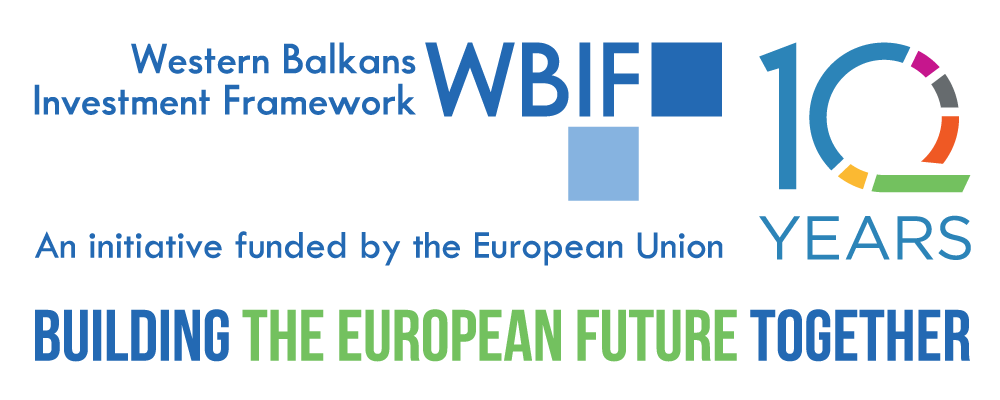Pupils of North Macedonia are now better prepared, more connected, as they have better access to modern digital tools of education due to the support provided by the Western Balkans Investment Framework. The ‘25 May’ school – with 1,500 pupils located in Gazi Baba (Skopje) – is just the starting point of a larger rehabilitation project initiated by the Ministry of Education and Science of North Macedonia.
The initiative was supported by €3 million in grants provided by the WBIF Bilateral Donors and two loans from the Council of Europe Development Bank in total value of €42.5 million. Specifically, the project concerns the construction of 70 physical education facilities and the rehabilitation of more than 60 primary and secondary schools throughout the country. This project will improve the teaching conditions for more than 11,000 pupils and 700 teachers.
The WBIF Bilateral Donor grant support has enabled the refurbishment of 10 primary and 6 secondary schools. The ‘25 May‘ school is one of the ten primary schools supported. Built in 1967, it currently accommodates about 1,500 pupils, aged 6-14. Prior to the WBIF support, no significant refurbishment activities had been carried out.
The ‘25 May’ school has received funding for renewing the roof and facades of the school building, window replacement, as well as rehabilitation of floor surfaces, the heating and electrical systems. This modernisation effort has especially improved the energy efficiency of the school, allowing it to save energy while improving teaching conditions. The energy savings, of more than 100% annually, generated by these investments have freed up financial resources which can be allocated for the purchase of new educational equipment.
The teachers of the ‘25 May’ school now have new furniture and teaching equipment, such as interactive whiteboards and video projectors in each classroom, therefore improving the digital skills of the pupils. This school stands as a flagship example for oher educational institutions of North Macedonia that are taking the ‘25 May’ as a reference point for equal access to adequate education infrastructure. The changes brought by this WBIF project have enabled a series of international exchanges with other schools by establishing protocols of cooperation with other centres in the country as well as from Albania, Kosovo*, Serbia, and Turkey. Pupils will be able to socialise with their peers, go to school together and, more importantly, experience cultural exchanges.
Obtaining European educational standards in the ’25 May’ school have attracted attention and admissions of new pupils. The ’25 May’ school’s enrolment rates have increased significantly after the renovation, as residents from municipalities other than Gazi Baba apply to register. This momentum originally started as a parent initiative; they started by undertaking minor renovations, painting the school fence and tidying up the schoolyard. This drive and enthusiasm from the local community came to the attention of the Ministry of Education and Science, which shortly after approved the request for renovation and reconstruction of the school financed by the WBIF.
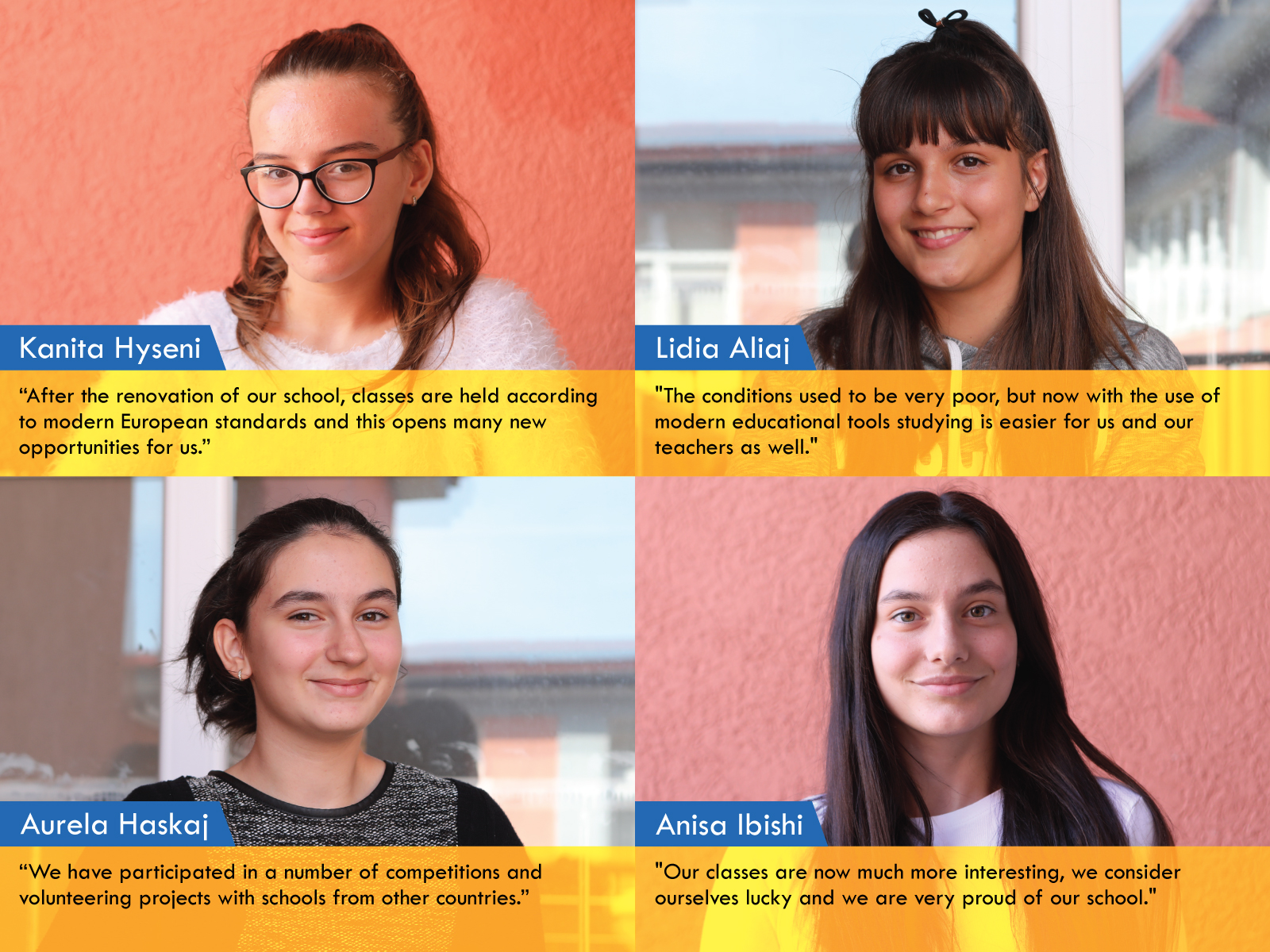
‘25 May‘ 9th grade students. (c) EU
The project “Construction of Physical Education Facilities in Primary Schools and Rehabilitation of Primary and Secondary Schools (Phase 1 & 2)” covers the construction of 70 new physical education facilities in primary and secondary schools and the rehabilitation of 60 primary and secondary schools. Easier access for pupils with disabilities is one of several benefits of the programme for renovation and construction of school facilities (which is fully in line with European standards ensuring accessibility for disabled persons).
Moreover, teaching conditions have improved therefore increasing the academic performance of more than 11,000 pupils; additionally, enrolment rates are increasing which fosters inclusive socio-economic development by offering a better learning and physical education environment.
The project (initiated in 2009) was included as part of a larger programme Ministry of Education and Science of North Macedonia. It benefited from two WBIF investment grants which have been made available by WBIF Bilateral Donors’ contributions to the Framework to rehabilitate and equip 10 primary and 6 secondary schools, as well as from two loans by the Council of Europe Development Bank (CEB).
These investments support the implementation of the National Strategy for Education Development 2018-2025; this strategy highlights several priorities directed towards inclusion, with actions enabling teachers and pedagogics to recognise pupils with special needs at an early stage. Another key priority is to include at least 30% of pupils with special needs in regular school activities.
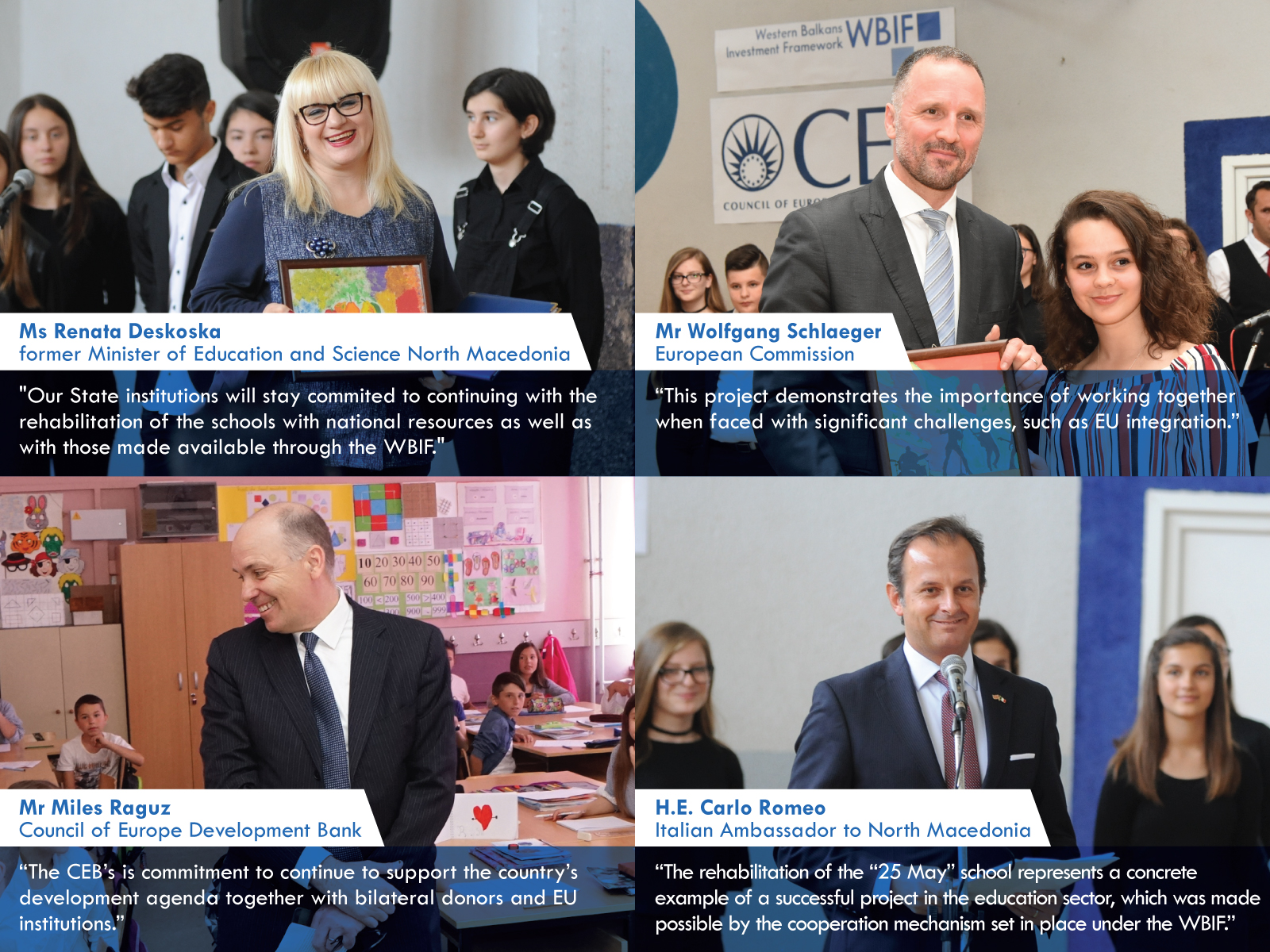
WBIF Stakeholders visit the school. (c) EU and CEB
WBIF was jointly launched in 2009 by the European Commission (DG ELARG now DG NEAR), International Financial Institutions and Bilateral Donors to enhance harmonisation and cooperation in investments for the socio-economic development of the Western Balkans. Together with the Western Balkan beneficiaries, WBIF forms a unique partnership, defining priorities and support packages needed for strategic investments and institutional reform. WBIF contributes to the European perspective of the Western Balkans by supporting not only investment projects improving competitiveness and growth, but also by reinforcing regional cooperation and connectivity. Eligible sectors include digital infrastructure, energy, environment, social, transport, and private sector development through WBIF’s dedicated initiative EDIF (Enterprise Development and Innovation Facility). This cooperation is only possible due to the close and coordinated interaction among the European Commission, International Financial Institutions and Bilateral Donors, together with the Western Balkan beneficiaries.
This year marks WBIF’s 10th anniversary, and during the past decade over €1 billion in grants were allocated for preparation and implementation of infrastructure projects. Starting with 2015, around €200 million in investment grants per annum is allocated to the Western Balkan beneficiaries for the implementation of Connectivity Agenda. The EU grant channelled through the WBIF since inception, will support investment projects with an estimated total investment cost of €18 billion. The successful implementation of the EU grant have resulted in many tangible and intangible gains, including but not limited to: significantly reduced travel times; increased transport safety; reduced emissions; improved quality of life and urban environment; better learning conditions; and increased competitiveness, etc.
Some of the concrete benefits of the infrastructure projects supported by WBIF will entail:
Besides physical infrastructure, these investments will reduce existing barriers making the horizon of European accession visible and obtainable.
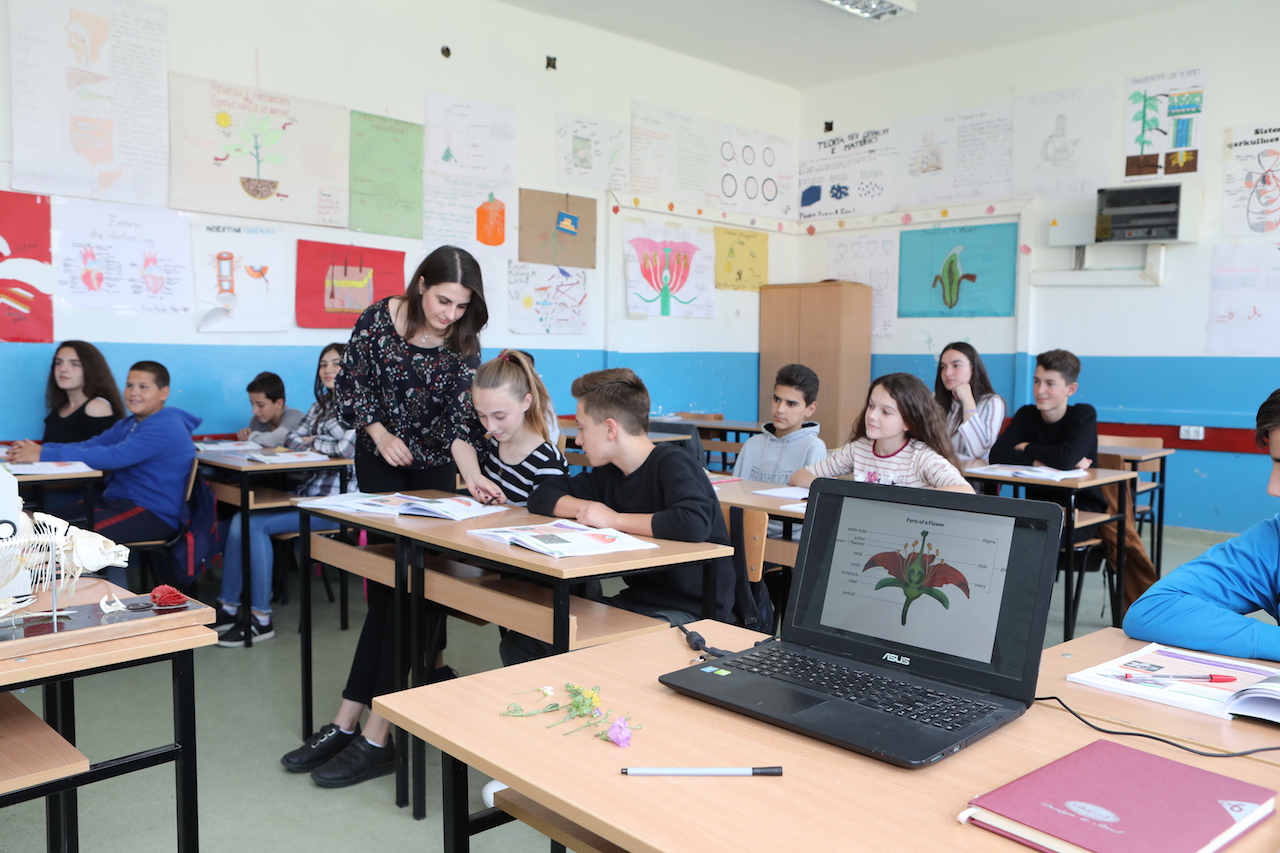
“The infrastructure investments for the school freed up resources to finance modern, digital teaching tools. The pupils could thus start on equal footing with those living in the European Union. The changes brought by this WBIF project have enabled a series of international exchanges with other schools also from Albania, Kosovo* and Serbia."
Fadil Murtezani, Primary school ‘25 May‘ Principal
Short video about the school. (c) Primary school ‘25 May‘
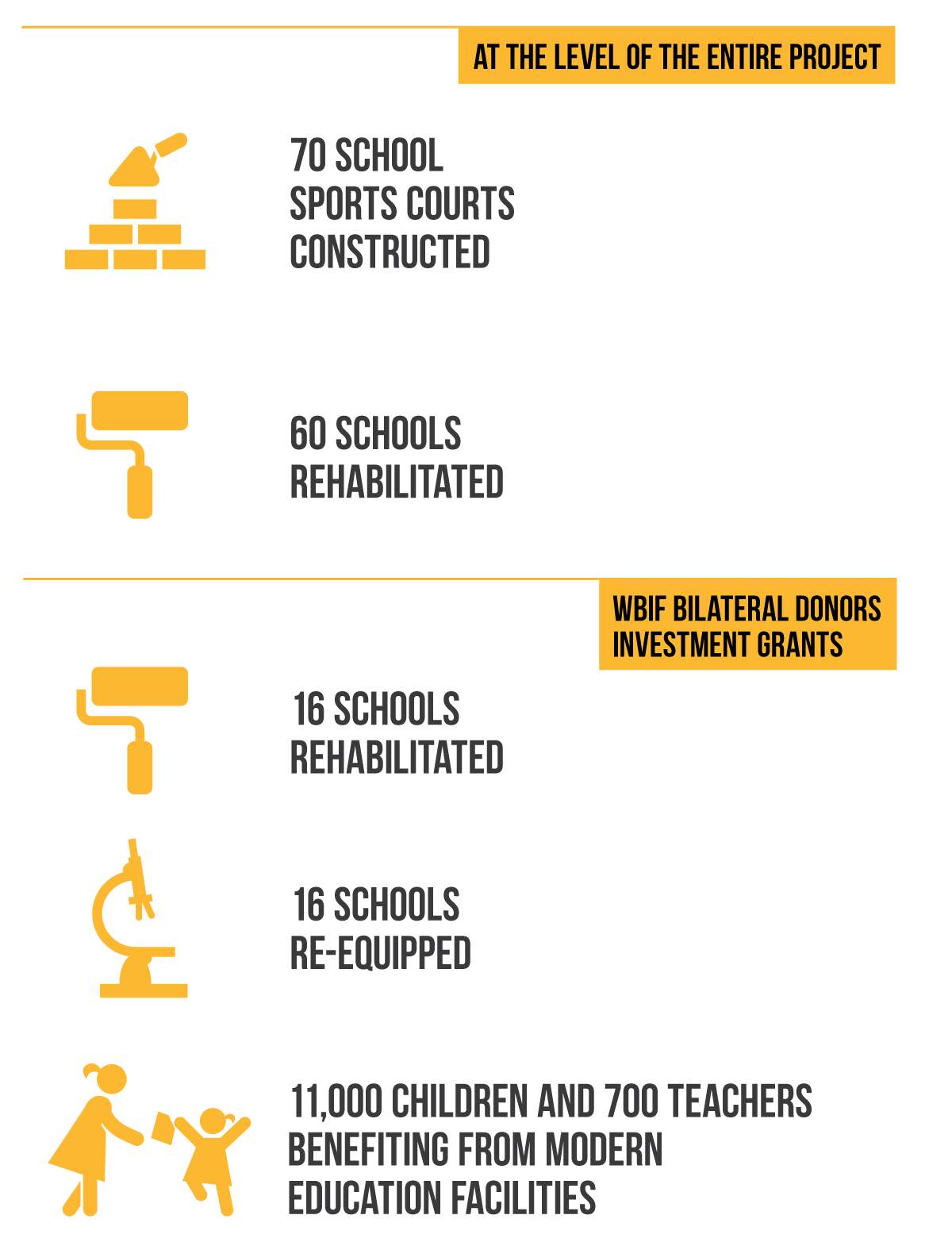
The modernisation of education infrastructure will enable inclusive socio-economic development by providing equal access for pupils, thus enabling North Macedonia to obtain education standards on par with the best European and international practice.
Project title:
Construction of Physical Education Facilities in Primary Schools and Rehabilitation of Primary and Secondary Schools (Phase 1 & 2)
WBIF Bilateral Donors’ contribution:
€3 m
Council of Europe Development Bank Loans:
€42.5 m
Beneficiary contribution:
€17.3 m (Ministry of Education and Science of North Macedonia)
TOTAL PROJECT VALUE:
€62.8 m
